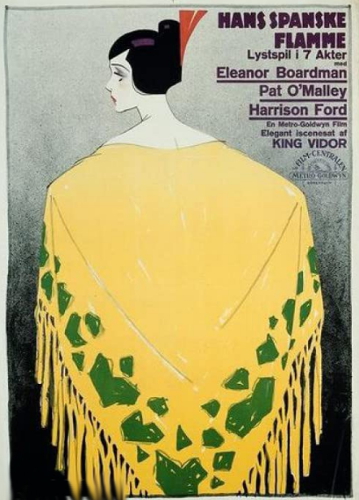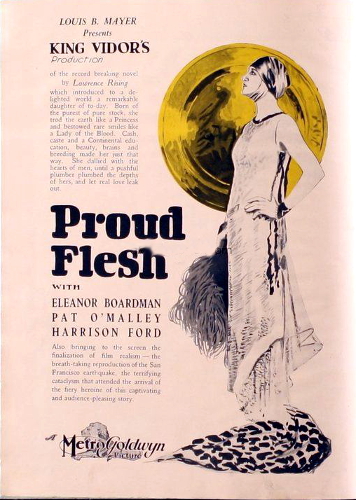 Stephanie
Jones (January 2022)
Stephanie
Jones (January 2022)
Rating: ![]()
![]() - 1/2 of
5
- 1/2 of
5
Reviewed
on this site for Joan purposes: Joan appears only as an extra in
party scenes at about the 35:02 thru 35:46 points of the movie.
Released in 1925 just before his much-more-renowned The Big Parade, Proud Flesh is a very minor silent film by director King Vidor, starring his soon-to-be wife Eleanor Boardman as "Fernanda," an American who was left an orphan by the San Francisco earthquake of 1906 and taken in by a Spanish family.
The titles early in the film give
you some idea of the ridiculousness of the premise:
"For
apparently no reason at all this story begins with the San Francisco
earthquake." (I'm guessing the studio forced Vidor to include
actual newsreel footage of the SF quake, and he had to find some
way to incorporate it into his plot.)
"Historians, writing of the earthquake, neglect to record the birth of Fernanda Borel...Which is one reason why history is so dull."
"Left an orphan, Fernanda was reared by the Borels in Spain...who really had done nothing to deserve such punishment."
(Such titles might indicate that the story to come, featuring Fernanda, is tempestuous and interesting...Alas, the story is about as generic and dull as can be.)
The early few minutes in Spain feature a pampered Fernanda: "To the servants, Fernanda was insane. She wasted a tubful of water every day, just for bathing." (Spoiler alert: Could there be a plumber in her future?!) Also featured in the Spanish scenes is her suitor Don Diego (Harrison Ford), an overt dandy who has his minions present him a mirror to gaze upon himself, sing his love songs for him, and build him a human tower to climb up to Fernanda's balcony.
Because Diego doesn't pay enough attention
to her, Fernanda announces: "I am leaving for San Francisco,
where my Uncle has a house with seventeen bathtubs on a hill."
(Again with the bathtubs... Spoiler alert: Could there be a plumber
in her future?!)
Fernanda arrives in SF and meets a self-made
American man who gives her a lift, a secretly wealthy plumber/contractor named "Patrick
O'Malley" (also played by an actor named "Pat O'Malley").
The dandy Don Diego has arrived at her aunt/uncle's house before
her. The rest of the film is a weak battle between the Old
World Diego and the Robust American O'Malley, with a bit of political
commentary thrown in.
At one point, Plumber O'Malley gives
a speech saying, "I'm as good as any man you ever met...Just
because I'm a plumber it doesn't mean that I'm not a gentleman...and
your equal!" O'Malley then asks what Washington/Lincoln/Roosevelt/Wilson
have all fought for..."to make us all free and equal!"
After this outburst, the snobbish Don Diego invites O'Malley
to tea, along with the Chinese butler and Fernanda's maid/companion.
Says Diego: "Now we are all free and equal...and uncomfortable."
(I can't remember seeing anything as awkward and honest as this in
any film aside from 1993's "Remains of the Day," when
the elites ask Anthony Hopkins' butler for his opinion on the current
political crisis and he is unable to answer.)
After
this, the film continues with a few more
snarky "Senor Plumber" and bathtub references. But
despite these, Fernanda's aunt and uncle host a party at which
Fernanda reluctantly dances with/starts to fall in love with
O'Malley (while the seedy Don Diego hangs out with a group of girls,
including Joan---her only brief appearances in the film occur
during several points in this under-1-minute-long stretch).
Cut to the next day, when Fernanda is simultaneously mesmerized
by the Great American
Outdoors (here typified by actual footage of Northern California's
Cypress Point) and the Honest American
Man (typified by O'Malley). After a few more simplistic plot
machinations, she finally accepts the down-to-earth (but rich) plumber as
her own. (The
European Dandy Don Diego, as it turns out, has another woman's address
at the ready.)
Overall, Proud Flesh is a stereotypical
example of 1925 studios simplistically touting the victory of the
"common man" over the "dandy." (It's the former,
after all, who came to see the pictures!)
 Tom C.
(July 2021)
Tom C.
(July 2021)
Rating:
![]()
![]()
![]() of 5
of 5
Spoiler alert! There is only a minute of JC---as an extra---in this movie. She pops up near the 35 minute mark. Check that---this is early enough in 1925 that she's still Lucille LeSueur.
I won't spoil the ending, but suffice it to say, it's a funny, light movie. About an hour in length. The intertitles, particularly early on, are very funny. Ms. Boardman looks lovely insofar as one can discern from the grainy B&W film available on YouTube. Messrs. Ford and O'Malley are quite good in their roles, especially the former.

